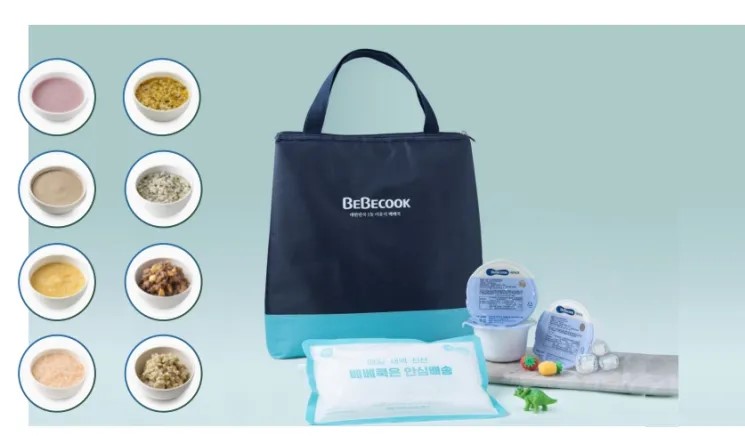Introduction
The baby food industry is experiencing transformative shifts worldwide, particularly in the realm of complementary foods. South Korea’s BeBecook has emerged as a dominant player in this sector, commanding a market share exceeding 30% in its domestic market. Additionally, its brand Alvins, launched in 2004, has achieved the second-largest market share. This article delves into how BeBecook achieved such remarkable success, contrasts the baby complementary food markets in China and Korea, and examines the future outlook for baby complementary food porridge in China.

The Current Landscape of South Korea’s Baby Complementary Food Market
Special Markets Foster Unique Products
As of 2023, South Korea, with a land area of around 100,000 square kilometers, has a total population of 51.09 million, with a significant concentration in the metropolitan area of Seoul. Despite its small geographic footprint, the country is experiencing demographic challenges characterized by an aging population and a declining birth rate. The number of newborns has been in continuous decline since 2021, with projections suggesting that 2023 will see fewer than 230,000 births—a stark contrast to China’s vast population.
The societal phenomenon termed “No love, no marriage, no children” presents a critical challenge in the maternal and child industry in South Korea. However, these national circumstances have fostered a substantial baby market, leading to the emergence of innovative product forms, particularly fresh complementary food porridge.
Characteristics of the Korean Baby Porridge Market
The Staged Approach to Complementary Foods
Korean mothers often introduce complementary foods to their babies using ready-to-eat fresh porridge options, beginning from the early stages of weaning until their children reach around three years of age. This staged approach reflects a systematic transition, where the variety of available options caters to different developmental stages.
Cold Chain Delivery System
One of the defining features of the Korean baby food sector is the cold chain delivery system. Orders are delivered fresh daily, ensuring that products maintain their nutritional integrity. The efficiency of this system is a result of a highly functional distribution network, allowing companies like BeBecook to ensure daily freshness in their offerings.
Intense Brand Competition
With a total fertility rate of 0.72, South Korea’s low birth rates have led to an increasingly saturated market with numerous competing brands. Despite the limited consumer base, the baby food supplement market is marked by fierce competition, prompting companies to innovate continuously to capture consumer loyalty.
Localization of Ingredients
A hallmark of the Korean baby porridge market is the emphasis on localized ingredients. Porridge recipes predominantly feature grains and Hanwoo beef, a prized local beef variety. This focus on local sourcing enables the production and delivery of diverse, non-repetitive items, catering to consumer preferences for fresh and healthy options.
BeBecook: A Case Study in Market Leadership
Business Model and Market Strategy
BeBecook operates two primary brands in South Korea—BeBecook and Alvins. The brand’s success is largely attributed to its commitment to quality and innovation. As the market for freshly prepared complementary food porridge began to emerge around 2000, BeBecook adapted to evolving consumer demands by establishing a robust e-commerce platform, including its mobile app.
Diverse Recipe Offerings
BeBecook provides a wide array of nearly 500 unique recipes throughout the year, ensuring that mothers can offer their children a different complementary porridge every day. This variety is critical in maintaining consumer engagement and loyalty.
Efficient Production and Delivery
Upon receiving an order, BeBecook’s factories can produce the porridge on the same day, with deliveries starting early the next morning. This efficient logistics network enables BeBecook to deliver fresh products to over 10,000 households across South Korea daily.
Consumer Loyalty and Retention
BeBecook has successfully built a strong consumer base, with mothers frequently purchasing its products for their infants from as young as five months old, continuing until the transition to regular meals. This enduring customer relationship is a testament to BeBecook’s quality and service excellence.
Comparative Analysis: China vs. Korea in Baby Complementary Foods
Distinct Market Characteristics
Chinese Baby Complementary Foods (Porridge)
- Preparation Methods: In China, many parents primarily prepare baby food at home, supplementing with commercially available rice cereals, fruit purees, and noodles.
- Market Development: The baby food porridge market in China is still in its nascent stage, with segmentation based on developmental stages gradually emerging.
- Nutritional Focus: There is an increasing emphasis on nutrient composition, with efforts to provide balanced dietary options as infants’ chewing abilities and digestive capacities develop.
Korean Baby Complementary Foods (Porridge)
- Professional Manufacturing: In contrast, Korea’s baby food companies produce their products using certified hygienic equipment, resulting in high usage rates of professionally made baby food.
- Established Segmentation: The Korean market has well-defined, stage-based baby complementary food systems that cater to the nutritional needs as children grow.
- Additive-Free Ingredients: The use of raw, unprocessed ingredients ensures a naturally balanced nutrient profile without additives.
Future Outlook for Baby Complementary Food Porridge in China
According to Tao Sheng’s projections, the domestic baby complementary food market in China is expected to exceed 30 billion RMB, with significant growth potential in prepackaged baby purees and porridge categories, which have demonstrated a 14% compound annual growth rate. The persistent upward trend is driven by several factors:
- Increasing Consumer Demand: As consumer awareness and preferences evolve, there is a growing demand for high-quality, nutritious baby food options.
- Frequent Repurchase Behavior: The high frequency of repurchase among parents seeking the best for their children indicates a robust market for baby complementary food.
- Enhanced Consumer Education: Ongoing efforts to educate consumers about the nutritional needs of infants and toddlers are expected to further stimulate market growth.
Conclusion
The baby complementary food sector is poised for significant expansion in China, drawing insights from the successful strategies employed by South Korea’s BeBecook. By understanding the dynamics of market competition, consumer behavior, and product innovation, stakeholders in China’s baby food industry can capitalize on emerging opportunities. The emphasis on quality and nutrition will be key to meeting the needs of modern families, setting the stage for a thriving market in the coming years.
Keywords:






